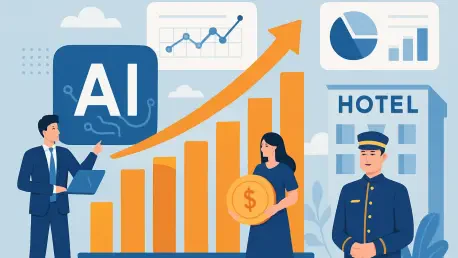What if the secret to skyrocketing hotel revenue lies not in cutting costs, but in harnessing technology to predict guest behavior with pinpoint accuracy? In a hospitality industry battered by fluctuating demand and razor-thin margins, a new beacon of hope has emerged for hoteliers striving to stay ahead. This comprehensive resource, released by a leading research entity, offers a lifeline to executives and managers desperate for innovative strategies in a tech-driven market. The stage is set for a deep dive into how the sector can redefine success through smarter revenue management.
Why This Moment Marks a Turning Point for Hospitality Revenue
The hospitality landscape in 2025 stands at a critical crossroads, with labor costs soaring by over 20% in many regions and booking windows shrinking to mere days. These pressures, compounded by heightened competition, have exposed the fragility of outdated revenue models. For hotel leaders, the urgency to adapt has never been more apparent, as guests now expect tailored experiences delivered at lightning speed.
This pivotal moment demands a shift from traditional approaches to a more dynamic, technology-infused strategy. The latest research underscores that clinging to old pricing tactics risks not just profitability, but relevance in an era where agility reigns supreme. Hoteliers must confront these realities head-on to seize the opportunities hidden within today’s challenges.
Decoding the New Hospitality Terrain: Challenges and Horizons
Navigating the current hospitality environment feels akin to steering through uncharted waters, where guest expectations evolve faster than ever. Beyond the squeeze of operational costs, the demand for personalized services has surged, pushing hotels to rethink how value is delivered across every touchpoint. This isn’t merely about filling rooms—it’s about maximizing every revenue stream, from dining to wellness offerings.
Competition has intensified across all market segments, with boutique properties and global chains alike vying for the same travelers. The need for a comprehensive approach that captures total revenue potential is no longer optional but essential. Success hinges on understanding these shifting dynamics and leveraging them to create standout guest experiences.
Core Revelations: Revolutionizing Revenue Management Strategies
Drawing from insights of over 350 industry leaders, the research reveals transformative trends reshaping how hotels approach revenue. A staggering 89% of executives now rely on AI and automation, with 83% reporting RevPAR increases of 5–15% after adopting advanced systems. These tools aren’t just add-ons; they’re the backbone of modern decision-making.
Another striking shift is the rise of non-room revenue, contributing nearly 40% to incremental income for many properties. This signals a broader focus on total revenue management, where ancillary services like food and beverage play a starring role. Additionally, real-time market responsiveness and sophisticated forecasting are replacing rigid frameworks, empowering hotels to adapt swiftly to volatility.
The numbers paint a clear picture: 96% of leaders credit AI with streamlining pricing processes, slashing time and costs. Meanwhile, 69% link personalized offers to improved guest satisfaction, proving that technology can enhance both efficiency and connection. These insights mark a definitive move toward data-driven hospitality.
Industry Perspectives: Technology’s Real-World Impact
Voices from the field bring the data to life, illustrating how tech transforms daily operations. A seasoned revenue strategist shared, “AI doesn’t just optimize pricing—it predicts what guests want before they even ask,” a sentiment echoed by many who see personalization as a game-changer. This aligns with findings that personalized offers drive higher satisfaction across the board.
Operational efficiency also gets a significant boost, with nearly all surveyed leaders noting smoother workflows thanks to integrated systems. Backed by rigorous analysis and supported by major industry players, these testimonials highlight a collective embrace of technology as the foundation for competitive edge. Hotels ignoring this wave risk being left behind in a rapidly evolving market.
Practical Blueprints for Revenue Triumph in Today’s Market
Moving beyond theory, the guide delivers actionable steps for hoteliers ready to implement change. It details how to select and integrate AI-powered Revenue Management Systems, focusing on platform evaluation and seamless data flow across teams. This ensures that technology serves as a unifier rather than a disruptor.
Breaking down operational silos emerges as another key focus, with strategies to align departments for maximum revenue impact. Collaboration between front-of-house and back-office teams can unlock hidden potential in underutilized services. The resource also advises on aligning tech investments with long-term commercial goals, a critical step for sustained growth.
For general managers and IT decision-makers, specific recommendations include mapping guest behavior trends to inform real-time adjustments. This approach not only boosts profitability but also builds resilience against market swings. Armed with these frameworks, hotels can confidently chart a path to enduring success.
Reflecting on a Transformative Journey
Looking back, the release of this pivotal guide marked a defining moment for an industry hungry for direction. It distilled complex challenges into clear, actionable solutions, empowering hoteliers to navigate a landscape reshaped by technology and expectation. The insights shared by leaders painted a vivid picture of transformation already underway.
The path forward became evident: embrace AI and automation not as luxuries, but as necessities for staying competitive. Hotel stakeholders who acted on these strategies found themselves better positioned to capitalize on non-room revenue and real-time adaptability. The journey revealed that success lies in anticipating guest needs with precision and agility.
As the industry continues to evolve, the focus must remain on integrating cross-departmental efforts and investing in scalable tech solutions. Exploring partnerships with innovative platforms can further amplify these gains, ensuring hotels remain ahead of the curve. This era of hospitality, defined by data and connection, demands bold steps toward a more profitable and guest-centric future.









